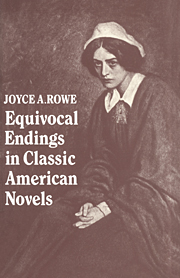 Equivocal Endings in Classic American Novels
Equivocal Endings in Classic American Novels Book contents
- Frontmatter
- Contents
- Acknowledgments
- Introduction
- 1 Nathaniel Hawthorne: “My Kinsman, Major Molineux”: The Several Voices of Independence
- 2 Bleak Dreams: Restriction and Aspiration in The Scarlet Letter
- 3 Mark Twain's Great Evasion: Adventures of Huckleberry Finn
- 4 Strether Unbound: The Selective Vision of Henry James's Ambassador
- 5 Closing the Circle: The Great Gatsby
- Conclusion: Moby-Dick and Our Problem with History
- Notes
- Index
1 - Nathaniel Hawthorne: “My Kinsman, Major Molineux”: The Several Voices of Independence
Published online by Cambridge University Press: 17 August 2009
- Frontmatter
- Contents
- Acknowledgments
- Introduction
- 1 Nathaniel Hawthorne: “My Kinsman, Major Molineux”: The Several Voices of Independence
- 2 Bleak Dreams: Restriction and Aspiration in The Scarlet Letter
- 3 Mark Twain's Great Evasion: Adventures of Huckleberry Finn
- 4 Strether Unbound: The Selective Vision of Henry James's Ambassador
- 5 Closing the Circle: The Great Gatsby
- Conclusion: Moby-Dick and Our Problem with History
- Notes
- Index
Summary
On they went, in counterfeited pomp, in senseless uproar, in frenzied merriment, trampling all on an old man's heart.
The fundamental analogy between the forces that shape individual being and those that move history onward is, I believe, the central concern of Hawthorne's major work. Nowhere does he examine the dynamic of this connection between individual and community with such dramatic compression and specificity of its American terms as in his early tale, “My Kinsman, Major Molineux.” Here we have an image of the dark side of “elsewhere” – the Hades of the rebellious young American soul. This story is perhaps Hawthorne's most successful effort to fuse symbolic and allegorical modes of expression in a dramatic rendering of the interconnections among psychological, moral, and historical realms of truth. The tale, set in a context of colonial protest against Crown-imposed governors of Massachusetts Bay, seems to conflate events of the 1730s with those of the 1760s and 1770s. But the hallucinatory atmosphere of the narrative transmutes given facts and historical allusions into a series of symbolic experiences which illuminate the subjective meaning of revolution and establish its role in determining the future contours of the American self.
Yet, despite the extraordinary imaginative control which the tale exhibits, I find in the ending an unwillingness to complete the narrative's thematic implications. Artfully seamless in its relation to the preceding drama, the ending nevertheless permits young Robin, whose appearance and name signify the budding self-sufficiency of the young country, to evade a full recognition of who and what he is.
- Type
- Chapter
- Information
- Equivocal Endings in Classic American NovelsThe Scarlet Letter; Adventures of Huckleberry Finn; The Ambassadors; The Great Gatsby, pp. 14 - 26Publisher: Cambridge University PressPrint publication year: 1988


